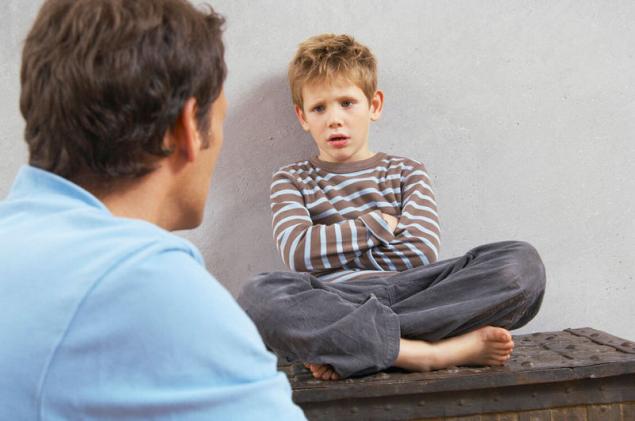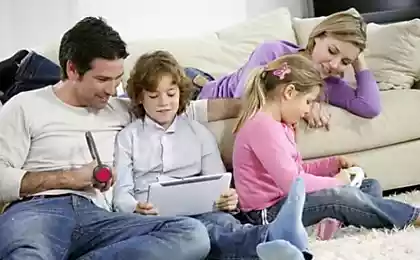541
How to understand a teenager
This simple answer to any question you certainly have to hear. Despite the simplicity of power he has is tremendous. Bring out the teachers, to confound parents discourage friends — all in his power. Simple and dangerous weapon that the teenager pulls out of his pocket quite often.
From what he protected?
A typical example from the life of a parent
The story could begin like this.
Parents: this weekend We're going out of town. Coming with us?
Teenager: I don't know...
Parents: Why?
Teenager: I Have plans...
Parents: What other plans? We have long been warned that we all wanted to go to the end of the month! Your plans can wait.
Teenager: Well, here's another! It's your can wait...

The dialogue can be a little different. But the meaning did not change.
Father: Want soccer going to play?
Teenager: I don't know... I'm busy.
Father: Yes, I see nothing you're not busy enough to fool the head!
Such conversations often end with no results. Parents are annoyed that a teenager again, does not listen, does things his way. The teenager once again convinced that no one understands and everyone just wants to piss him off. A lot of emotions, both parties are offended and go to their corners like boxers at the corners of the ring waiting for the next round. And wise are those parents who at this point are asking themselves: "what he wanted to say this don't know?"
You need to accept that for the answer "don't know", there is always a certain meaning. It can be discovered to go from bickering to a constructive dialogue.
Imagine that you are in a country which language I don't know. You have learned two or three phrases that you have to answer most of the questions. One of these phrases — saving "I don't know." People ask you the time, the road, interested in your plans and you have to tell them "don't know", painting the phrase those or other emotions. "Don't know" can sound aggressive when you want to be left alone. Or as an excuse if you try not to offend people. The questioner, in turn, may not let you achieve precise, clear answer. And not getting it, may get angry, swear.But the reason is simple — you have not yet learned to speak this language.
It is also possible that language you know, but you have trouble speaking and efforts should be made to formulate an idea. In this case, it is easier to say "don't know", because they are too lazy to think, not in the habit of thinking.
Now, transfer this example on the teenager — he can dwell in such situations often. And here is the way your help. To help him, try to think together! Don't be afraid to ask clarifying questions, find arguments for and against, give yourself and him time to think. This is the same as thinking aloud.
Here's how it can be in the same example with the trip.
Parents: this weekend We're going out of town. Coming with us?
Teenager: I don't know...
Parents: And what do you know? Like it or not?
Teenager: I never thought about it...
Parents: Well, if you figure out what disadvantages this trip? Will need a little work in the garden, to make the lessons...
Teenager: Still the road is long and terrible...
Parents: But there are obvious advantages: meeting with friends, fishing, more freedom.
Teenager: Well, Yes, quite.
The illusion of freedom
If you watch the way parents ask questions, you can see one General approach, which, unfortunately, occurs often. Briefly it can be described by the phrase: "There are two answers to my question. One — I want to hear, the other wrong".
Mom: Son, help my father clean things?
Son: I don't know...
Mom: Well, what do you mean? Yes or no?
Son: Well, no.
Mom: What do you mean no? He do you think one needs all the work to do around the house?
Masterful in freedom of choice, do not say anything!
If a teenager is different from the "correct" response, it is at a crossroads: to say "Yes" he does not want, and if you say no, hear rebuke from relatives who mean a lot to him. Where is then the choice? Teenager it always feels and is willing to fight to have that he is deprived of freedom of choice. And freedom he needed the air, because it is nurtured and grows his strength of will, independence, ability to make decisions and take responsibility for them.
This does not mean that the mother in our example should meekly accept the answer of the son and silently look at the suffering of a father struggling with things alone. The imaginary freedom of choice is more efficient to transform into two different types of situations.
To the first belong all the situations where there is no choice, and there are agreements and responsibilities. It is normal that in the family dad ensures that the paintings fell from the walls, mom — that in the refrigerator was food. Teenager may guarantee constant availability of feed for domestic animals. There are many options, and it's all perfectly solved on a family Council. It is fair and just.
And the second type of situations, you take it where there is freedom of choice. If, for example, the right to go or not to go to the country, the decision is not questioned and even more condemnation from parents. The right to decide in this case is only a teenager, and the adults provide a reality of choice.
All this was possible, the family should undergo a key transformation: the role of the teenager in it must change. If he had taken the place of the child and had no influence on family decisions, he must now rise to the next step and earn the right to participate in family Council, to be included in family life. And if the parents are aware of the changed situation and facilitate this transition, a family on one adult getting bigger.
Often parents become the main obstacle to such a change. Psychological inertia causes them to look at the teenager as forever a little boy or girl, for which it is necessary to look, who can do nothing himself, while to recognize a teenager an adult is to give him the right to vote, in the adoption of various family decisions. Now he can discuss the family budget and "to enter the territory of the other", which previously remained outside his influence. Responsibilities that parents want to impose on the teenager, can not exist separately from the rights that are given to it. Rights and duties are two sides of the same coin.
Obviously, it is important to find harmony between responsibilities and freedom. And every family harmony will be his. Do not be afraid of excessive freedom. Teenager looking for her just as much as internally feels the need to Express their opinions, desires.
When all the family members take their places and perform their roles, they often answer "don't know" disappears as unnecessary.
By the teenager
In life and in conflict situations especially, the teenager falls hard. Moreover, it is simply part of parental opinion. It is difficult to think about their feelings, to reflect. And that is what is important to him. But here's the problem: it is poorly understands himself and his feelings, desires. And so when he wants to learn more about yourself, he asked the others. The opinion of a friend or girlfriend, accidentally thrown in his direction phrase — all is extremely important, podmetaetsya.
Repeat what you wrote in the beginning: to understand your feelings and emotions for Teens is extremely important, and if you are able to help him, don't dawdle. For example, vague answer "do Not know" to the proposal of friends to go to the movies can mean: "I really want to go, but I have no money and I'm embarrassed to ask" or "I have already been invited to another session, and I don't know how to say this without offending you" or "I today really not in the mood to go to the movies, but I'm afraid you do not understand, if I say so".
You see, those phrases much more accurately explain why the teenager will not go to the movies. In order to Express them, it takes more inner courage. But let's believe that courage enough. And you, in turn, need to prepare yourself for the fact that at some point, you will hear "do Not want" instead of "don't know". It will be a major step forward in your teenager.
The reasons for "don't know" much more than we could describe. We have not sought to compile a directory of all possible options, but wanted to show that this topic is controversial and multifaceted. Look at it with all you soul and as advised by the poet Jan Twardowski, HURRY to LOVE! published
Authors: Barbara and Paul Cadelina
P. S. And remember, only by changing their consumption — together we change the world! ©
Join us in Facebook , Vkontakte, Odnoklassniki
Source: www.manwb.ru/articles/psychology/pedagogics/ped/
From what he protected?
A typical example from the life of a parent
The story could begin like this.
Parents: this weekend We're going out of town. Coming with us?
Teenager: I don't know...
Parents: Why?
Teenager: I Have plans...
Parents: What other plans? We have long been warned that we all wanted to go to the end of the month! Your plans can wait.
Teenager: Well, here's another! It's your can wait...

The dialogue can be a little different. But the meaning did not change.
Father: Want soccer going to play?
Teenager: I don't know... I'm busy.
Father: Yes, I see nothing you're not busy enough to fool the head!
Such conversations often end with no results. Parents are annoyed that a teenager again, does not listen, does things his way. The teenager once again convinced that no one understands and everyone just wants to piss him off. A lot of emotions, both parties are offended and go to their corners like boxers at the corners of the ring waiting for the next round. And wise are those parents who at this point are asking themselves: "what he wanted to say this don't know?"
You need to accept that for the answer "don't know", there is always a certain meaning. It can be discovered to go from bickering to a constructive dialogue.
Imagine that you are in a country which language I don't know. You have learned two or three phrases that you have to answer most of the questions. One of these phrases — saving "I don't know." People ask you the time, the road, interested in your plans and you have to tell them "don't know", painting the phrase those or other emotions. "Don't know" can sound aggressive when you want to be left alone. Or as an excuse if you try not to offend people. The questioner, in turn, may not let you achieve precise, clear answer. And not getting it, may get angry, swear.But the reason is simple — you have not yet learned to speak this language.
It is also possible that language you know, but you have trouble speaking and efforts should be made to formulate an idea. In this case, it is easier to say "don't know", because they are too lazy to think, not in the habit of thinking.
Now, transfer this example on the teenager — he can dwell in such situations often. And here is the way your help. To help him, try to think together! Don't be afraid to ask clarifying questions, find arguments for and against, give yourself and him time to think. This is the same as thinking aloud.
Here's how it can be in the same example with the trip.
Parents: this weekend We're going out of town. Coming with us?
Teenager: I don't know...
Parents: And what do you know? Like it or not?
Teenager: I never thought about it...
Parents: Well, if you figure out what disadvantages this trip? Will need a little work in the garden, to make the lessons...
Teenager: Still the road is long and terrible...
Parents: But there are obvious advantages: meeting with friends, fishing, more freedom.
Teenager: Well, Yes, quite.
The illusion of freedom
If you watch the way parents ask questions, you can see one General approach, which, unfortunately, occurs often. Briefly it can be described by the phrase: "There are two answers to my question. One — I want to hear, the other wrong".
Mom: Son, help my father clean things?
Son: I don't know...
Mom: Well, what do you mean? Yes or no?
Son: Well, no.
Mom: What do you mean no? He do you think one needs all the work to do around the house?
Masterful in freedom of choice, do not say anything!
If a teenager is different from the "correct" response, it is at a crossroads: to say "Yes" he does not want, and if you say no, hear rebuke from relatives who mean a lot to him. Where is then the choice? Teenager it always feels and is willing to fight to have that he is deprived of freedom of choice. And freedom he needed the air, because it is nurtured and grows his strength of will, independence, ability to make decisions and take responsibility for them.
This does not mean that the mother in our example should meekly accept the answer of the son and silently look at the suffering of a father struggling with things alone. The imaginary freedom of choice is more efficient to transform into two different types of situations.
To the first belong all the situations where there is no choice, and there are agreements and responsibilities. It is normal that in the family dad ensures that the paintings fell from the walls, mom — that in the refrigerator was food. Teenager may guarantee constant availability of feed for domestic animals. There are many options, and it's all perfectly solved on a family Council. It is fair and just.
And the second type of situations, you take it where there is freedom of choice. If, for example, the right to go or not to go to the country, the decision is not questioned and even more condemnation from parents. The right to decide in this case is only a teenager, and the adults provide a reality of choice.
All this was possible, the family should undergo a key transformation: the role of the teenager in it must change. If he had taken the place of the child and had no influence on family decisions, he must now rise to the next step and earn the right to participate in family Council, to be included in family life. And if the parents are aware of the changed situation and facilitate this transition, a family on one adult getting bigger.
Often parents become the main obstacle to such a change. Psychological inertia causes them to look at the teenager as forever a little boy or girl, for which it is necessary to look, who can do nothing himself, while to recognize a teenager an adult is to give him the right to vote, in the adoption of various family decisions. Now he can discuss the family budget and "to enter the territory of the other", which previously remained outside his influence. Responsibilities that parents want to impose on the teenager, can not exist separately from the rights that are given to it. Rights and duties are two sides of the same coin.
Obviously, it is important to find harmony between responsibilities and freedom. And every family harmony will be his. Do not be afraid of excessive freedom. Teenager looking for her just as much as internally feels the need to Express their opinions, desires.
When all the family members take their places and perform their roles, they often answer "don't know" disappears as unnecessary.
By the teenager

In life and in conflict situations especially, the teenager falls hard. Moreover, it is simply part of parental opinion. It is difficult to think about their feelings, to reflect. And that is what is important to him. But here's the problem: it is poorly understands himself and his feelings, desires. And so when he wants to learn more about yourself, he asked the others. The opinion of a friend or girlfriend, accidentally thrown in his direction phrase — all is extremely important, podmetaetsya.
Repeat what you wrote in the beginning: to understand your feelings and emotions for Teens is extremely important, and if you are able to help him, don't dawdle. For example, vague answer "do Not know" to the proposal of friends to go to the movies can mean: "I really want to go, but I have no money and I'm embarrassed to ask" or "I have already been invited to another session, and I don't know how to say this without offending you" or "I today really not in the mood to go to the movies, but I'm afraid you do not understand, if I say so".
You see, those phrases much more accurately explain why the teenager will not go to the movies. In order to Express them, it takes more inner courage. But let's believe that courage enough. And you, in turn, need to prepare yourself for the fact that at some point, you will hear "do Not want" instead of "don't know". It will be a major step forward in your teenager.
The reasons for "don't know" much more than we could describe. We have not sought to compile a directory of all possible options, but wanted to show that this topic is controversial and multifaceted. Look at it with all you soul and as advised by the poet Jan Twardowski, HURRY to LOVE! published
Authors: Barbara and Paul Cadelina
P. S. And remember, only by changing their consumption — together we change the world! ©
Join us in Facebook , Vkontakte, Odnoklassniki
Source: www.manwb.ru/articles/psychology/pedagogics/ped/























